ruger P89, P90 P94, P944 User Guide
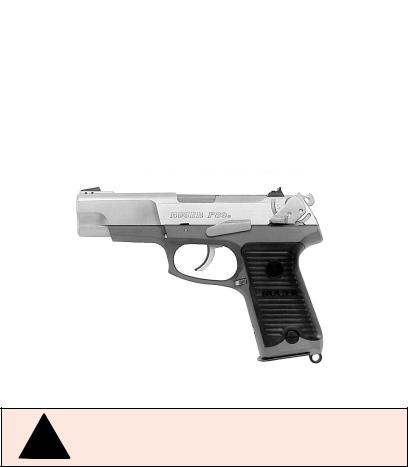
INSTRUCTION
MANUAL
FOR
BLUED & |
CALIBERS |
STAINLESS |
9mm, .30 Luger, |
STEEL |
.40 Auto & .45ACP |
RUGER® P-SERIES
P89, P90 P94 & P944
MANUAL SAFETY MODEL PISTOLS*
*DO NOT USE THIS MANUAL FOR DECOCKER MODEL PISTOLS
OR “DOUBLE ACTION ONLY” PISTOLS
READ THE INSTRUCTIONS AND
!WARNINGS IN THIS MANUAL CAREFULLY BEFORE USING THIS FIREARM
For Product Service on This Model Please Call: (928) 778-6555 (See p. 27)
STURM, RUGER & Company, Inc.
Southport, Connecticut 06890 U.S.A.
THIS INSTRUCTION MANUAL SHOULD ALWAYS ACCOMPANY THIS FIREARM AND BE TRANSFERRED WITH IT UPON CHANGE OF OWNERSHIP, OR WHEN THE FIREARM IS LOANED OR PRESENTED TO ANOTHER PERSON
V & KV (MS) 9/02 C R6
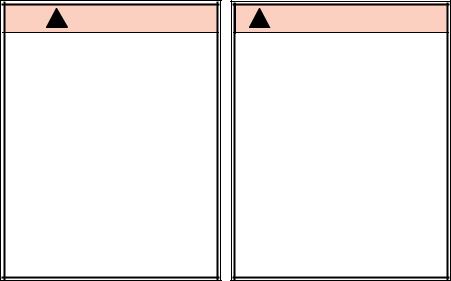
State-By-State Warnings
Certain states require by law that their own specified warning notices in larger-than-normal type be conspicuously included by the manufacturer, distributor, or retail dealer with firearms sold in that state. Sturm, Ruger sells its products in compliance with applicable laws and regulations. Because our products may be sold in these states, we include the following:
California:
! WARNING
“Children are attracted to and can operate firearms that can cause severe injuries or death. Prevent child access by always keeping guns locked away and unloaded when not in use. If you keep a loaded firearm where a child obtains and improperly uses it, you can be fined or sent to prison.”
! ADVERTENCIA
“A los niños los atraen las armas de fuego y las pueden hacer funcionar. Ellos pueden causarses lesions graves y la muerte. Evite que los niños tengan accesso a las armas de fuego guardándolas siempre con llave y descargadas cuando no las esté utilizando. Si usted tiene un arma de fuego cargada en un lugar en que un niño tiene acceso a ella y la usa indebidamente, le pueden dar una multa o enviarlo a la carcel.”
Connecticut:
“UNLAWFUL STORAGE OF A LOADED FIREARM MAY RESULT IN IMPRISONMENT OR FINE.”
Florida:
“IT IS UNLAWFUL, AND PUNISHABLE BY IMPRISONMENT AND FINE, FOR ANY ADULT TO STORE OR LEAVE A FIREARM IN ANY PLACE WITHIN THE REACH OR EASY ACCESS OF A MINOR UNDER 18 YEARS OF AGE OR TO KNOWINGLY SELL OR OTHERWISE TRANSFER OWNERSHIP OR POSSESSION OF A FIREARM TO A MINOR OR A PERSON OF UNSOUND MIND.”
2
Maine:
“ENDANGERING THE WELFARE OF A CHILD IS A CRIME. IF YOU LEAVE A FIREARM AND AMMUNITION WITHIN EASY ACCESS OF A CHILD, YOU MAY BE SUBJECT TO FINE, IMPRISONMENT OR BOTH. KEEP FIREARMS AND AMMUNITION SEPARATE. KEEP FIREARMS AND AMMUNITION LOCKED UP. USE TRIGGER LOCKS.”
Maryland:
“WARNING: Children can operate firearms which may cause death or serious injury. It is a crime to store or leave a loaded firearm in any location where an individual knew or should have known that an unsupervised minor would gain access to the firearm. Store your firearm responsibly!”
Massachusetts:
“WARNING FROM THE MASSACHUSETTS ATTORNEY GENERAL: This handgun is not equipped with a device that fully blocks use by unauthorized users. More than 200,000 firearms like this one are stolen from their owners every year in the United States. In addition, there are more than a thousand suicides each year by younger children and teenagers who get access to firearms. Hundreds more die from accidental discharge. It is likely that many more children sustain serious wounds, or inflict such wounds accidentally on others. In order to limit the chance of such misuse, it is imperative that you keep this weapon locked in a secure place and take other steps necessary to limit the possibility of theft or accident. Failure to take reasonable preventive steps may result in innocent lives being lost, and in some circumstances may result in your liability for these deaths.”
“IT IS UNLAWFUL TO STORE OR KEEP A FIREARM, RIFLE, SHOTGUN OR MACHINE GUN IN ANY PLACE UNLESS THAT WEAPON IS EQUIPPED WITH A TAM- PER-RESISTANT SAFETY DEVICE OR IS STORED OR KEPT IN A SECURELY LOCKED CONTAINER.”
3
New Jersey:
“IT IS A CRIMINAL OFFENSE TO LEAVE A LOADED FIREARM WITHIN EASY ACCESS OF A MINOR.”
New York City:
“THE USE OF A LOCKING DEVICE OR SAFETY LOCK IS ONLY ONE ASPECT OF RESPONSIBLE WEAPONS STORAGE. ALL WEAPONS SHOULD BE STORED UNLOADED AND LOCKED IN A LOCATION THAT IS BOTH SEPARATE FROM THEIR AMMUNITION AND INACCESSIBLE TO CHILDREN AND ANY OTHER UNAUTHORIZED PERSONS.”
North Carolina:
“IT IS UNLAWFUL TO STORE OR LEAVE A FIREARM THAT CAN BE DISCHARGED IN A MANNER THAT A REASONABLE PERSON SHOULD KNOW IS ACCESSIBLE TO A MINOR.”
Texas:
“IT IS UNLAWFUL TO STORE, TRANSPORT, OR ABANDON AN UNSECURED FIREARM IN A PLACE WHERE CHILDREN ARE LIKELY TO BE AND CAN OBTAIN ACCESS TO THE FIREARM.”
Wisconsin:
“IF YOU LEAVE A LOADED FIREARM WITHIN THE REACH OR EASY ACCESS OF A CHILD YOU MAY BE FINED OR IMPRISONED OR BOTH IF THE CHILD IMPROPERLY DISCHARGES, POSSESSES, OR EXHIBITS THE FIREARM.”
* * * * * * * * * * * * * * * * * * * * * *
Please check with your licensed retailer or state police for additional warnings which may be required by local law or regulation. Such regulations change constantly, and local authorities are in the best position to advise you on such legal matters.
4
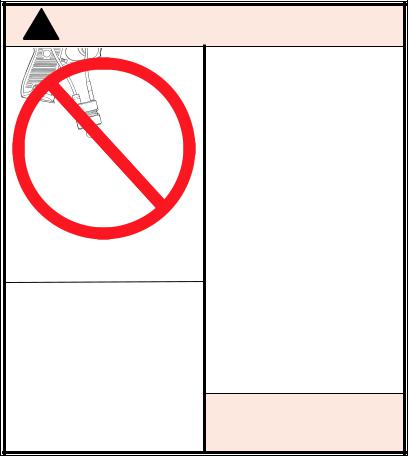
WHY ARE WE INCLUDING A FIRED CARTRIDGE CASE WITH EVERY RUGER PISTOL AND REVOLVER?
Certain states and jurisdictions now require that all newly manufactured pistols and revolvers must be accompanied by a cartridge case, which has been test fired from that gun at the factory. The case must be placed in a sealed container bearing certain information concerning this test cartridge.
At the time of retail sale in those jurisdictions, firearms dealers must forward such test cartridge to a designated destination such as their State Police Laboratory. As independent Ruger Distributors have nationwide markets without territorial restrictions, we have decided to include a fired cartridge case with all new Ruger pistols and revolvers, to minimize the possibility of inadvertent noncompliance with these laws.
Retail customers located in other states, where laws or regulations do not require the dealer to so act, may be assured that the fired cartridge case they receive with the firearm at the time of retail purchase is proof that your new Ruger firearm has undergone our normal test firing procedures during manufacture.
! WARNING – LOCKING DEVICES
DO NOT INSTALL
INSIDE TRIGGER GUARD
INSTALL LOCK
AS SHOWN HERE
This firearm was originally sold with a key-operated locking device. While it can help provide secure storage for your unloaded firearm, any locking device can fail. All guns are designed to fire if they are loaded and the trigger is pulled. Therefore, never install the locking device inside the trigger guard or in any way that it can possibly pull the trigger! Do not leave the keys in the lock.
The ultimate responsibility for secure storage of any firearm must depend upon its owner and his or her individual circumstances. Guns should be securely stored unloaded, in a secure location, separate from their ammunition.
See “Storage Warning”, page 26.
NEVER INSTALL
LOCKING DEVICE
INSIDE TRIGGER GUARD
5

FIREARMS SAFETY - YOUR RESPONSIBILITY
SAFETY MUST BE THE FIRST AND CONSTANT CONSIDERATION OF EVERY PERSON WHO HANDLES FIREARMS AND AMMUNITION.
This Instruction Manual is designed to assist you in learning how to use and care for your RUGER® P89, P90, P94 and P944 Manual Safety Model Pistols properly. Please contact us if you have any questions.
Only when you are certain you fully understand the Manual and can properly carry out its instructions should you practice loading, unloading, etc. with live ammunition. If you have any doubts about your ability to handle or use a particular type of gun safely, you should seek supervised instruction. Such personalized instruction is often available from gun dealers, gun clubs or police departments. If none of these sources can help you, write to the National Rifle Association, 11250 Waples Mill, Fairfax, VA 22030-7400. They will assist you.
The person possessing a gun has a full-time job. You cannot guess; you cannot forget. You must know how to use your firearm safely. Do not use any firearm without having a complete understanding of its particular characteristics and safe use. Remember: There is no such thing as a foolproof gun.
TABLE OF CONTENTS
State-By-State Warnings . . . . . . . . . . . . . . . . . . . . . . . . . . . . . . . . . . . . .2 General Information and Mechanical Characteristics . . . . . . . . . . . . . . .7 Operation of Manual Safety . . . . . . . . . . . . . . . . . . . . . . . . . . . . . . . . . .10 Ammunition . . . . . . . . . . . . . . . . . . . . . . . . . . . . . . . . . . . . . . . . . . . . .12 To Load and Fire (with magazine) . . . . . . . . . . . . . . . . . . . . . . . . . . . .13 To Uncock (Decock) The Pistol . . . . . . . . . . . . . . . . . . . . . . . . . . . . . . .16 To Load and Fire (without magazine) . . . . . . . . . . . . . . . . . . . . . . . . . .17 To Unload . . . . . . . . . . . . . . . . . . . . . . . . . . . . . . . . . . . . . . . . . . . . . . .17 To Reload The Pistol . . . . . . . . . . . . . . . . . . . . . . . . . . . . . . . . . . . . . . .19 To Extract and Eject a Chambered Cartridge . . . . . . . . . . . . . . . . . . . .19 To Clear a Malfunction (“Jam”) . . . . . . . . . . . . . . . . . . . . . . . . . . . . . . .20 To Minimize Malfunctions (“Jams”) . . . . . . . . . . . . . . . . . . . . . . . . . . .21 To Disassemble . . . . . . . . . . . . . . . . . . . . . . . . . . . . . . . . . . . . . . . . . . .21 To Reassemble . . . . . . . . . . . . . . . . . . . . . . . . . . . . . . . . . . . . . . . . . . . .23 Magazine Inspection and Care . . . . . . . . . . . . . . . . . . . . . . . . . . . . . . . .23 Care and Cleaning . . . . . . . . . . . . . . . . . . . . . . . . . . . . . . . . . . . . . . . . .24 Storage . . . . . . . . . . . . . . . . . . . . . . . . . . . . . . . . . . . . . . . . . . . . . . . . .25 Sight Adjustment . . . . . . . . . . . . . . . . . . . . . . . . . . . . . . . . . . . . . . . . .27 Service and Parts Policy . . . . . . . . . . . . . . . . . . . . . . . . . . . . . . . . . . . .27 Parts Drawings . . . . . . . . . . . . . . . . . . . . . . . . . . . . . . . . .35, 36, 37 & 38 The Basic Rules of Safe Firearms Handling . . . . . . . . . . . . . . . . . . . . .39 Warranty Information . . . . . . . . . . . . . . . . . . . . . . . . . . . . . . . . . . . . . .44
“Ruger” is a registered U.S. trademark. P89, P90 and P94 are Sturm, Ruger trademarks.
6

WARNINGS OF GREAT IMPORTANCE ARE
!FOUND ON THE FOLLOWING PAGES:
Locking Devices |
5 |
Unloading |
17 |
Alterations |
7 |
Slide Retraction |
18 |
Manual Safety |
11 |
Malfunctions |
20 |
Lead Exposure |
11 |
Disassembly |
23 |
Ammunition |
13 |
Lubrication |
25 |
Firing |
15 |
Storage |
26 |
Handling |
16 |
Parts Purchasers |
28 |
OTHER CAUTIONS AND WARNINGS APPEAR
THROUGHOUT THE MANUAL.
FIREARMS ARE DANGEROUS WEAPONS - READ THE INSTRUCTIONS AND WARNINGS IN THIS MANUAL THOROUGHLY AND CAREFULLY BEFORE USING.
!WARNING - ALTERATIONS
This product was designed to function properly in its original condition. Alterations can make it unsafe. Do not alter any part or add or substitute parts or accessories not made by Sturm, Ruger & Co. Inc.
DO NOT ALTER ANY GUN
GENERAL INFORMATION
AND MECHANICAL CHARACTERISTICS
The RUGER® P89, P90, P94 & P944 pistols are centerfire, double action, magazine-fed, autoloading, recoil-operated pistols. The P89 is chambered for the caliber 9mm Parabellum (9mm x19) cartridge, and the P90 is chambered for the .45 ACP cartridge. The P94 has a full length “streamlined” slide configuration and is chambered for the 9mm Parabellum (9mm x 19) cartridge. The P944 is chambered for the .40 S&W cartridge. The cartridge for which the pistol is chambered is clearly marked on the barrel. They comply with the requirements of the National Institute of Justice Standard - 0112.00. They include the following features with which users should be thoroughly familiar:
7
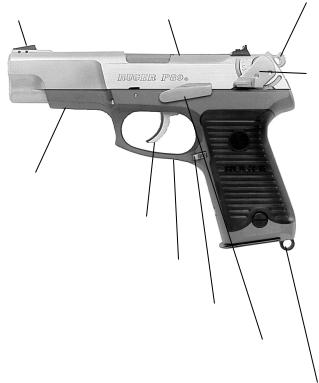
NOMENCLATURE
Sights have high-visibility |
Slide’s open top design minimizes possi- |
Grooved, exposed hammer |
white dots both front and |
bility of jamming, enables shooter to |
spur enables the shooter to |
rear. Rear sights can be |
clear any malfunction easily by hand. |
cock the hammer easily for |
adjusted for windage. |
Cartridges can be loaded singly if desired. |
accurate single-action fir- |
|
|
ing if desired. |
|
|
When ambidextrous manual |
|
|
safety is in “safe” position, |
|
|
the firing pin is cammed |
|
|
forward into the slide. This |
|
|
simultaneously places the |
|
|
firing pin out of reach of |
|
|
the hammer and locks the |
|
|
firing pin in a neutral posi- |
|
|
tion, preventing the firing |
|
|
pin from movement toward |
|
|
the cartridge. Further, the |
|
|
entire firing mechanism is |
|
|
completely disengaged from |
|
|
trigger. |
hand. Recurved trigger guard bow accommodates nonshooting hand in two-hand hold.
The magazine latch permits positive retention and quick removal of magazine.
Slide stop holds the slide open and is activated automatically when last shot is fired (if magazine is in pistol), or can be manually operated.
Lanyard loop provides security for carrying in the field or police use.
Action: The action of the Ruger manual safety model pistols is of the U.S. M1911 type that utilizes a tilting barrel design in which the barrel and slide are locked together at the moment of firing. After firing, the barrel and slide recoil to the rear a short distance while still locked together. After this initial movement, the barrel tilts downward from its locked position, permitting full recoil of the slide and the extraction and ejection of the spent cartridge case.
The user of this or any autoloading pistol must always remember that when fired, it automatically reloads and recocks itself, so that simply pulling the trigger will fire the pistol again. Therefore, an autoloading pistol user must be particularly conscious to always keep the pistol pointed in a safe direction.
8

Slide Stop: When the last shot has been fired and the magazine is empty, the slide stop automatically holds the slide open. When there is an empty magazine in the pistol and the slide is retracted manually, the slide stop will automatically hold the slide open. If a loaded magazine is inserted in the pistol when the slide is closed and the slide is then retracted fully, the slide stop will not automatically hold open the slide. The user can actuate the slide stop mechanism to hold the slide open at any time by retracting the slide and pushing up the slide stop.
The slide stop can be released by drawing back slightly on the slide and depressing the slide stop thumbpiece. When the slide is released, it will move forward under pressure from the recoil spring.
The slide stop is spring-loaded to move downward. Therefore, when there is a loaded magazine in place and the pistol is jarred, the slide can fly forward and chamber a cartridge. For this reason and as an essential safety practice, the user should always be careful to keep fingers away from the trigger, keep the safety on, and always keep the pistol pointed in a safe direction.
Magazines: The Ruger 9mm, .40Auto, and .45 ACP magazines are not interchangeable with Ruger pistol magazines of any other caliber even though they may appear similar and may hold other cartridges. Use of incorrect magazines in any pistol will result in malfunctions. Ruger 9mm magazines are either unmarked as to caliber or are marked “9mm cal. only”. All other Ruger centerfire pistol magazines, which are similar in appearance, are marked as to caliber (“.40 Auto Cal.,” etc.).
DAMAGED, NON-STANDARD, OR IMPROPERLY ASSEMBLED MAGAZINES SHOULD NOT BE USED. THEY CAN CAUSE THE PISTOL TO MALFUNCTION.
9
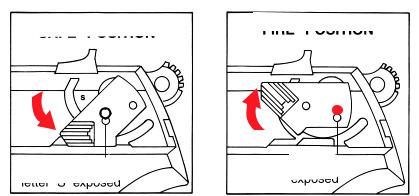
OPERATION OF MANUAL SAFETY
The model you have selected is equipped with special manual ambidextrous safety levers that also allow you to decock (uncock) a cocked pistol without manipulating the trigger. Conventional thumb decocking procedures are therefore not necessary and should not be employed with this pistol.
To apply the manual safety and decock the pistol, point the pistol in a safe direction. Move either the rightor left-hand safety lever fully to the “safe” position. When the safety is moved fully downward to the “safe” position, the white dot is exposed through the hole in the side of the safety and the letter “S” is completely visible. In this position (1) the firing pin is blocked from moving forward, (2) the hammer is blocked from contacting the firing pin, and (3) the entire firing mechanism is completely disengaged from the trigger. At this point, the hammer will fall to its forward (decocked) position.
The safety mechanism provides that the hammer cannot contact the firing pin unless the safety is disengaged. With the hammer cocked, actuating the safety mechanism automatically drops the hammer onto the slide without contacting the firing pin. Thus, the safety also serves as a decocking lever.
Additionally, the pistol has a separate internal firing pin block which will not allow the firing pin to move forward and contact the cartridge until the operator pulls the trigger with the safety off (in its “fire” position).
The pistol can and should be loaded and unloaded with the safety engaged in its “safe” position (lever fully down, white dot and the letter “S” exposed). The safety should be in its “safe” position at all times except when the user is deliberately positioned to fire at a selected target. See Figures 1 and 2, below, which illustrate the two positions of the safety.
"SAFE" POSITION |
"FIRE" POSITION |
White dot and |
Red dot |
letter "S" exposed |
exposed |
FIGURE 1 |
FIGURE 2 |
10
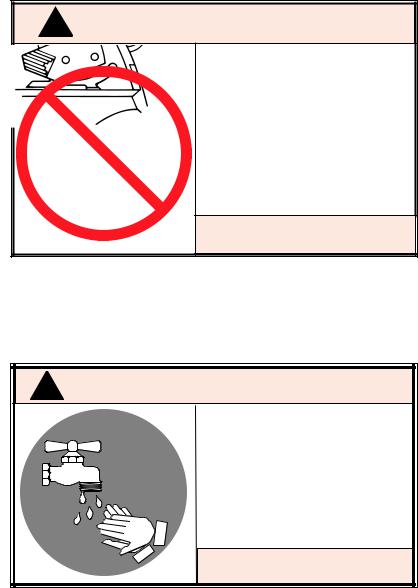
!WARNING - MANUAL SAFETY
Placing the safety in an intermediate position between “safe” and “fire” can result in the user thinking the pistol is in a safe or fire position when it is not. Pulling the trigger with the safety in an intermediate position may cause the pistol to fire. Therefore, always move the safety fully to its intended position and then check to be sure it is where you want it to be. Unless the white dot and the letter “S” are both fully visible, the safety is not on. Unless the red dot is fully visible, the pistol is not absolutely ready to fire.
NEVER PUT SAFETY 1/2 ON
!WARNING - LEAD EXPOSURE
Discharging firearms in poorly ventilated areas, cleaning firearms, or handling ammunition may result in exposure to lead and other substances known to the state of California to cause birth defects, reproductive harm, and other serious physical injury. Have adequate ventilation at all times. Wash hands thoroughly after exposure.
SHOOTING OR CLEANING GUNS
MAY EXPOSE YOU TO LEAD
11

AMMUNITION
The RUGER® P89 & P94 pistols are chambered for the 9mm x 19 Parabellum (9mm Luger) cartridge. Do not attempt to load any other 9mm cartridges (examples: 9mm short [.380], 9mm Steyr, 9mm Bergmann, etc.) into the magazine or chamber of the pistol. Never attempt to use caliber .40 S & W cartridges in a 9mm pistol. The .40 S & W cartridges will jam the pistol.
The RUGER® P90 pistol is chambered for the .45 ACP cartridge. Do not attempt to load any cartridges other than .45 ACP into the magazine or chamber of the pistol.
The RUGER® P944 pistols chambered for the .40 S&W cartridge should never be used with 9mm ammunition.
The KP89X pistol is a stainless-steel Convertible Model chambered for both 9mm and .30 Luger barrels. Do not attempt to load 9mm cartridges in the pistol when the .30 Luger barrel is installed and do not attempt to load .30 Luger cartridges in the pistol when the 9mm barrel is in place. The pistol will not function correctly. See “Ammunition Warning”, p. 13.
The Ruger P-Series pistols are compatible with all factory ammunition loaded to U.S. Industry Standards, including high-velocity and hollow-point loads, loaded in brass, aluminum, or steel cartridge cases. No 9mm x 19, .45 ACP or .40 S & W ammunition manufactured in accordance with NATO, U.S., SAAMI, or CIP standards is known to be beyond the design limits or known not to function in these pistols.
USE ONLY FACTORY AMMUNITION LOADED
TO U.S. INDUSTRY STANDARDS
AMMUNITION (CARTRIDGES) NOTICE
WE SPECIFICALLY DISCLAIM RESPONSIBILITY FOR ANY DAMAGE OR INJURY WHATSOEVER OCCURRING IN CONNECTION WITH, OR AS A RESULT OF, THE USE IN RUGER FIREARMS OF FAULTY, OR NON-STANDARD, OR “RE-MANUFACTURED”, OR HANDLOADED (RELOADED) AMMUNITION, OR OF CARTRIDGES OTHER THAN THOSE FOR WHICH THE FIREARM WAS ORIGINALLY CHAMBERED.
12
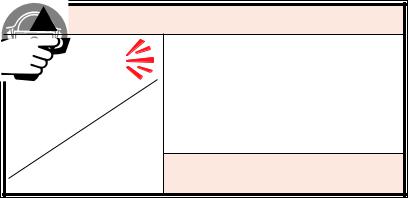
! WARNING - AMMUNITION
Death, serious injury, and damage can result from the use of the wrong ammunition, bore obstructions, powder overloads, or incorrect cartridge components. Even the strongest gun can be “blown up” as a result of excess pressure. Always wear shooting glasses and hearing protection.
IMPROPER AMMUNITION
DESTROYS GUNS
TO LOAD AND FIRE (WITH MAGAZINE)
Practice this important aspect of safe gun handling with an unloaded pistol until you can perform each of the steps described below with skill and confidence. But before you do anything with the pistol, first read completely through this manual.
1.Be certain the muzzle is pointed in a safe direction. (See “The Basic Rules of Safe Firearms Handling,” page 39)
2.Move either the rightor left-hand safety lever fully downward to its “safe” position so that the letter “S” and the white dot are fully exposed. (See Figures 1 and 2 on page 10).
3.Press either magazine latch forward and remove the magazine from the frame. NOTE: The magazine is designed to fall free of the frame of its own weight when unloaded and the pistol is held in the normal firing position, but you should always prevent possible damage to the magazine by not letting it drop to the ground unless rapid reloading is absolutely necessary.
For the 9mm P89 and P94 pistols, place ten (10) or fewer 9mm x 19 Parabellum cartridges into the magazine from the top.
For the P90 pistol, place eight (8) or fewer .45 ACP cartridges into the magazine from the top.
For the .40 Auto P944 pistols, place ten (10) or fewer .40 S&W cartridges into the magazine from the top.
For the KP89X Convertible Model, the 9mm and .30 Luger barrels use the same magazine. The magazines provided with the pistol (which are marked 9mm) are suitable for use with both 9mm and .30 Luger cartridges.
13
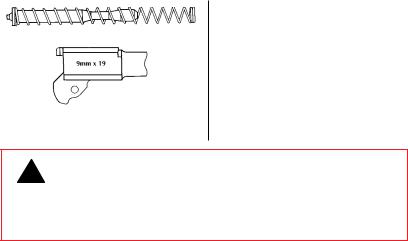
When firing 9mm cartridges, the barrel marked with the caliber “9mm x 19” must be used. The correct recoil spring and guide rod combination for 9mm use is the spring that extends a little over an inch beyond the guide rod when this assembly has been removed from the firearm and the guide rod that has a tapered section about 1/3 from its front end. See illustration below left.
When firing .30 Luger cartridges, the barrel marked with caliber “.30 Luger” must be used. The correct recoil spring and guide rod combination for .30 Luger use is the captive spring which is attached to the untapered guide rod and does not extend beyond the rod when the assembly has been removed from the firearm. See illustration below right.
9mm |
.30 Luger |
9mm Recoil Spring and Guide Rod Assembly |
.30 Luger Spring and Guide Rod Assembly |
|
|
9mm |
|
|
.30 Luger |
||
Barrel |
||
Barrel |
||
|
||
|
|
CAUTION: Firing the KP89X Convertible Model with the incorrect ! barrel and recoil spring combination could result in malfunction or
damage to the firearm. Instructions for removing and replacing the barrel and recoil spring/guide rod assembly are contained in the “Disassembly” instructions on page 21.
5.Insert the magazine into the frame, taking care that the magazine is locked in place by the magazine latch. Slamming the magazine into the frame forcibly is not necessary.
6.Hold the pistol firmly in the shooting hand but do not touch the trigger. Keep the pistol pointed in a safe direction and the safety “on”. With the thumb and forefinger of the other hand grasp the rear of the slide and pull the slide to the rear as far as it will go (See Figure 3, p. 15 and “Slide Retraction Warning”, p. 18). When released, the slide will fly forward to strip the top cartridge from the magazine and chamber it. The safety mechanism drops the hammer automatically as the slide moves forward while simultaneously blocking the firing pin.
14
